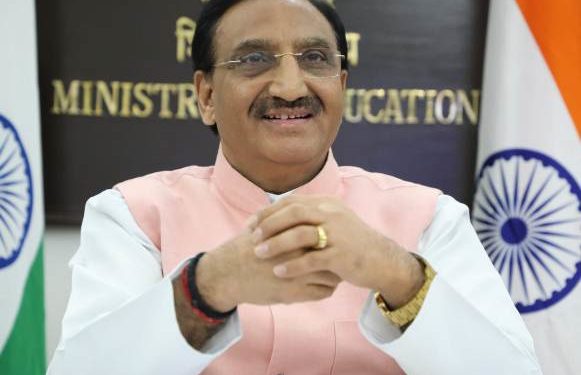November 7, 2020.
TED NewsDesk, New Delhi. The Indian Institute of Technology (IIT) Kharagpur will set-up a Centre of Excellence for the Indian Knowledge System, as announced by the Union Education Minister Ramesh Pokhriyal ‘Nishank’ while inaugurating the international webinar titled ‘Bharata Tirtha’ organised by the institute. “IIT-Kharagpur has attempted to introspect on the spirit of India, her challenges in the present times, and taken the right measures through an initiative like Bharata Tirtha and research,” the minister said in a virtual address. The first challenge in front of us is that the coming generations need to be made aware of the glorious past of Vishwaguru and its spirit, he said.
During his address, the Minister also emphasised education through the mother tongue and rejuvenation of Sanskrit to ease the educational process for the diverse populace in India, while learning from the rich scholarly heritage. Minister of State for Education, Sanjay Dhotre, who was the guest of honour, said that there exists a necessity to critically study and analyse the interdisciplinary nature of the Indian knowledge system in the present times. “Spectacular achievements of the past can inspire us but cannot sustain us in the present. It is our responsibility to equip the Indian knowledge system with Indian ethos and values and attempt pursuit of excellence in every chosen field,” he added.
Virendra K Tewari, Director, IIT-Kharagpur, expressed the need to acknowledge and incentivise research work on Indian Scientific Heritage by awarding the prestigious Shanti Swarup Bhatnagar Prize. “SS Bhatnagar prize is a dream goal for science and technology researchers in India. I want to request our Education Minister to contemplate on proposing the Hon’ble Minister for Science and Technology Dr Harsh Vardhan to create a new vertical on Indian scientific heritage under this prestigious prize.”
The three-day webinar started today and will see inspirational talks by international experts in Indic studies inclusive of Arthashastra, Sanskrit for natural language processing, Vedic and ancient Indian mathematics – numeral system, Bijaganita and Jyamiti, Rasayana (chemical sciences), Ayurveda (biological sciences), Jyotir-tatha Mahajagatika Vidya (positional and astronomical sciences), Prakriti vidya (terrestrial/ material sciences/ ecology and atmospheric sciences), and Nandana Tathya tatha Vastu Vidya (archaeology, iconography, and architecture). Such initiatives can significantly benefit the marginalised sections of India and expand the outreach of research work and innovative learning.
Source: The Indian Express








